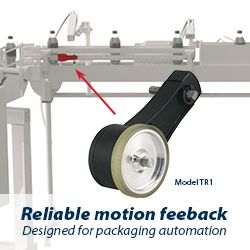Once the initial cost is managed, the only costs in factory automation are about repairs and maintenance. So, appointing robots is always cheaper than employing human resources.
 Factory Automation Streamlines Production and Improves Profit Margin
Factory Automation Streamlines Production and Improves Profit Margin

Research from | Allied Market Research
There’s simply no doubt in the fact that automation has made our lives easier like never before! When the automated bill paying system makes sure that you never forget to pay for the monthly Dish TV subscription, the automatic windows in your car check you from fidgeting with the irksome crank to get a quick gush of wind! Also, can you really ignore the automatic doors that help you with your hefty grocery carts out of the store? So, automation is all about ease and expediency; but then, it’s an absolute necessity as well. Especially, in the manufacturing industry, automation is something that’s an out-and-out requirement indeed.
Reduced cost
Once the initial cost is managed, the only costs in factory automation are about repairs and maintenance. So, appointing robots is always cheaper than employing human resources. And, in the long run, it actually leads to huge savings when compared to the annual CTC of human employees, and a higher return on investment.
Better manufacturing
Optimizing the entire process, factory automation makes sure that the manufacturing is more effectual and more lucrative. This way, the human workers become free for fine-tuning process and putting more focus on tasks that cannot be automated. This steers for improved customization, ground-breaking products and a better consumer experience.
High Quality
No matter how great a human worker might be, they are prone to errors. But, factory automated control systems are more accurate than humans and thus, eliminates the factor of human errors. To ensure a much more consistent final product, this aspect can simply not be ignored. The fact that automated devices are never fatigued or tired unlike human resources paves the way for high quality output. No matter how huge or vast the task is, robots will never lose their focus from work. So, factory automation turns down errors and helps to perk up quality standards to a great extent.
High flexibility
Human resources need to be trained for new processes on board. Even a simple new task in the assembly line demands a number of training hours for the operating personnel. Moreover, they need to get used to new processes which is actually time taking. And then, the companies might have to incur a significant loss due to trainer fees. With industry automation, on the other hand, new methods can be instantly incorporated in the manufacturing process, thereby increasing production flexibility.
High accuracy
Then, it certainly should be about higher accuracy. Making important business decisions can never be successful without the availability of relevant production related data. And, manual data collection can be a bit pricey. Also, there are chances of human errors while collecting the same. Data, when collected manually, has to be verified and crosschecked for consistency before it can be utilized for any eloquent purposes. Here, by gathering data automatically from sensors and devices, factory automation not only saves time, but also guarantees much accuracy as well as perfection. This way, data can also be acquired frequently, whenever required. And, management can obtain the most recent data before embarking on any important decisions.
In a nutshell, incorporating an array of technologies and reflex control devices to improve the efficiency and quality of products, factory automation makes sure the production cost is decreased to a significant extent. Commonly termed as industrial automation, it curtails down human involvement in the industry and guarantees a greater as well as superior accomplishment as compared to human resources. It makes the best use of information technologies, control systems, robots and computers, thereby paving the way for a much better industrial process. And, the outcome is certainly praiseworthy! Standardizing industrial processes, factory automation has now swelled up its demand in industries where qualitative and reliable manufacturing is the ultimate objective that gets followed.
Also, when it comes to minimum operational cost, there is certainly no replacement for industrial or factory automation. Making room for lesser labor expenses, enhanced quality and minutest human interference, this high-end tech fulfils the demand of mass production with minutest investment.
According to Allied Market Research, the global factory automation market is expected to grow at a significant CAGR from 2018–2025. Rise in demand for automation for qualitative and consistent manufacturing, mounting need for mass production with condensed operation cost, and increase in adoption of industry 4.0 drive the growth. On the other hand, limited availability of specialists and
high implementation expenses for factory automation systems are expected to check the growth to some extent. However, surge in the demand for automation in Asian countries such as China and Japan has almost modulated the factors and created multiple opportunities in the near future.
To conclude, we can state that the factory automation market is proliferating at a jet’s pace and it’s going to thrive yet more in the years to come.
The content & opinions in this article are the author’s and do not necessarily represent the views of ManufacturingTomorrow
Comments (0)
This post does not have any comments. Be the first to leave a comment below.
Featured Product

